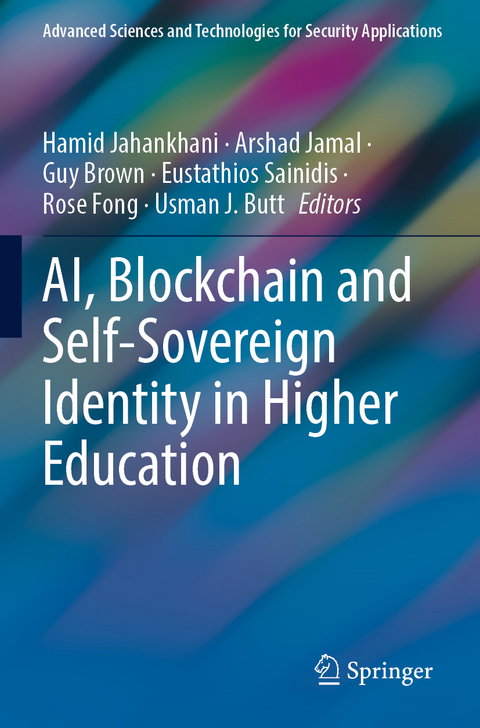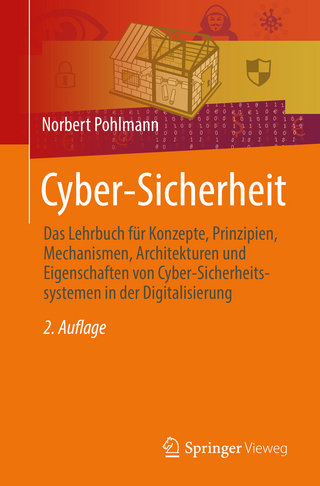
AI, Blockchain and Self-Sovereign Identity in Higher Education
Springer International Publishing (Verlag)
978-3-031-33629-4 (ISBN)
This book aims to explore the next generation of online learning challenges including the security and privacy issues of digital transformation strategies that is required in teaching and learning. Also, what efforts does the industry need to invest in changing mind-sets and behaviours of both students and faculty members in adoption of virtual and blended learning?
The book provides a comprehensive coverage of not only the technical and ethical issues presented by the use of AI, blockchain and self-sovereign identity, but also the adversarial application of AI and its associated implications. The authors recommend a number of novel approaches to assist in better detecting, thwarting and addressing AI challenges in higher education.
The book provides a valuable reference for cyber security experts and practitioners, network security professionals and higher education strategist and decision-makers. It is also aimed at researchers seeking to obtain a more profound knowledge of machine learning and deep learning in the context of cyber security and AI in higher education. Each chapter is written by an internationally renowned expert who has extensive experience in industry or academia. Furthermore, this book blends advanced research findings with practice-based methods to provide the reader with advanced understanding and relevant skills.
Professor Hamid Jahankhani has taught at both the undergraduate and postgraduate levels, full and part time, and supervised and examined research students at the M.Phil., Ph.D. levels and Doctorate in Professional Studies (D.Prof.). Hamid's teaching has covered a broad range of computing modules in particular Information Security Management, Information Security Risk and Audit, Digital Forensics, Systems Design & Development, Telecommunications and Networking and Computer Systems. Hamid's principal research area for a number of years has been in the field of information security management and digital forensics.
Dr Arshad Jamal is Dean and Director of Research and Education at Northumbria University London Campus with QAHE. He has substantial experience in academic leadership, strategic planning, people development, programme development, teaching and research. Arshad has wealth of industry and consultancy experience. He has also worked as Chief Technical Officer and led teams to deliver large IT projects. He holds a Ph.D. in Information Systems and Computing from Brunel University and is Internationally Recognised Academic. His teaching background covers a diverse range of subjects including Information Systems, Business and Data Analytics, Big Data, AI, Machine Learning, Operations and Supply Chain Management, Strategic Management, Strategic Leadership, E-Business and Information Security. His research interest lies in Information Systems, Information Security, AI and Data Analytics, Knowledge Management, Technostress, Operations Management and E-Learning. He has published research in peer-reviewed journals and conferences as well as edited books and authored book chapters.
Dr Guy Brown is Dean of students who had designed, delivered and evaluated a range of higher education projects to embed the use of technology in all aspects of the student journey, including pre enrolment, on-boarding, educational analytics, technology-led personal tutoring,online and blended learning delivery and gamification.
Dr Eustathios Sainidis is Senior Lecturer in Strategic Management at Northumbria University and Deputy and Director of the Northumbria University London Campus. He is Experienced Academic, has taught extensively at undergraduate and postgraduate levels and has supervised and examined a number of doctoral candidates. Eustathios is Active Researcher in the subject of manufacturing strategy in SMEs and has a particular interest in the application of mixed methods in business and management research. He has published extensively in high-quality, peer-reviewed international journals and has also contributed chapters to a number of scholarly books and academic textbooks.
Dr Rose Fong is currently Deputy Associate Dean/Head of the Department of Computing at Northumbria University London/ QAHE. She was Programme Leader of M.Sc. Cyber Security Technology and B.Sc. (Hons) in Applied Computing. She has been involved into thedesign and development of various IT and cyber security programmes/modules for Northumbria University London.
Prior to her current position, she was Senior Lecturer in Computing in Hong Kong. With over 25-year teaching experiences in a wide ranges of IT-related subjects, Rose took up different programme leaderships in various IT programmes such as creative and interactive media production, business analytics, information systems development and network administration at both subdegree and bachelor's degree level. Rose was also heavily involved in different student services such as scholarship at college level as Director of Student Services. She is Certified Personality Dimension® Level 1 Facilitator. She was Centre Manager of the Personal and Career Development Centre, Community College of City University, in 2012-14. She had conducted over 150 sessions to her students in career planning and personal development.
Her main research interests are user-centred design andtes
1. The Role of Blockchain with a Cybersecurity Maturity Model in the Governance of Higher Education Supply Chains.- 2. Fighting the Tide - GPT and An Alarming Sense of Déjà Vu.- 3. Embedding AI in Higher Education: a call for a service design approach.- 4. An empirical study into Ransomware campaigns against the Education Sector & adopting the Cybersecurity Maturity Model Certification Framework.- 5. Strategic Decision-Making for Pedagogical Course Planning using NLP in Social Media.- 6. The Use of Virtual Learning Environments in Higher Education - Content, Community and Connectivism - Learning From Student Users.- 7. Influence of Artificial Intelligence in Higher Education; Impact, Risk and Counter Measure.- 8. Development of a Decentralized Personal Indefinable information (PII) management systems using Blockchain DBFT consensus Algorithm.- 9. Security Framework for Big Data usage in cloud-based e-learning application.- 10. A proactive approach to protect cloud computing environment against a Distributed Denial of Service (DDoS) attack.
| Erscheinungsdatum | 25.06.2024 |
|---|---|
| Reihe/Serie | Advanced Sciences and Technologies for Security Applications |
| Zusatzinfo | VI, 313 p. 151 illus., 132 illus. in color. |
| Verlagsort | Cham |
| Sprache | englisch |
| Maße | 155 x 235 mm |
| Themenwelt | Informatik ► Netzwerke ► Sicherheit / Firewall |
| Schlagworte | Artificial Intelligence • Blockchain • cyber security • Deep learning • higher education • machine learning • Network Security |
| ISBN-10 | 3-031-33629-1 / 3031336291 |
| ISBN-13 | 978-3-031-33629-4 / 9783031336294 |
| Zustand | Neuware |
| Haben Sie eine Frage zum Produkt? |
aus dem Bereich


